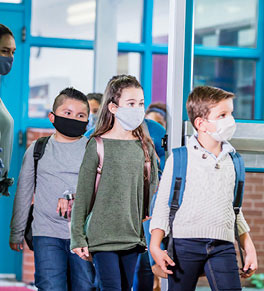Coping with reentry anxiety as the pandemic wanes

With California lifting masking and other restrictions borne of the COVID-19 pandemic, many of us are wondering — and anxious about — how and if we or our kids will be able to get back to normal.
“You can think of the pandemic as a collective trauma that we have all experienced over this past year,” says UCI Health child psychiatrist Dr. Leslie B. Tarver, who is seeing reentry anxiety among her patients and other people she encounters.
After enduring 15 months of varying levels of lockdown, feeling comfortable in those public spaces we used to frequent may take a while. It may be especially challenging for younger children who cannot get vaccinated because there isn’t one approved for kids under 12.
Taking it slow, may be the best approach.
Support systems, routines uprooted
“It’s important to understand what this experience has been like for children and adults,” says Tarver, medical director of the UCI Health Intensive Outpatient Program and the Partial Hospitalization Program.
“The things people used to rely on for connection and support were suddenly changed. People experienced physical and financial losses. People close to them died or became ill — children, especially, were worried about their parents and about exposing their grandparents,” she explains.
“They’ve habituated to an indoor way of life, apart from friends, classmates and relatives. How do they reenter the world again without being retraumatized?”
Children are vulnerable
Children may be resilient, but the pandemic has had an emotional and developmental impact on them. They need guidance and support to understand what they are feeling and what venturing out again means for their future.
They’re likely to experience reentry anxiety when returning to pre-pandemic activities as well as unease and stress about what things will be like going forward. They also take their cues from the adults around them.
“As parents and grandparents, we set the tone,” Tarver says. “If we’re anxious, our kids will be anxious. Try to maintain the delicate balance between shielding your children from reentry and tossing them into the deep end in a return to normal activities.”
Tips for coping
For children and adults, she offers these tips to cope with anxiety about returning to school, summer camp, work and regular activities:
- Follow safety guidelines: Use the U.S. Centers for Disease Control and Prevention guidelines to communicate how to stay safe while engaging in activities and what ways we can relax our routines and still protect ourselves.
- Communicate and validate feelings: Ask about fears and validate what your child is experiencing without going into “fixer mode.” Once you know what people’s fears are, validate those feelings without feeding into them. Instead, help children ease into the changes in COVID-19 routines and keep checking in with them throughout the process.
- Set the tone: Be calm and objective about what needs to happen and how, which will foster trust from children and others. Don’t let your anxiety drive decisions but be aware that false confidence can backfire if a future reversal in the pandemic means a return to restrictions. Encourage flexibility so everyone is prepared if the situation changes.
- Reenter gradually: Be patient and listen to children to better gauge what they can handle. Although it’s important to not totally avoid things that make us anxious, a complete and sudden return to all previous activities may be overwhelming. Practice gradually resuming activities and setting small goals that help build confidence. For example, start with one activity at a time or limiting a playdate to a shorter time period rather than returning to karate, soccer, Chinese language lessons, computer programming and playdates all at once.
When help is needed
According to the American Psychological Association, nearly 50% of Americans say they are anxious about resuming in-person interactions.
Some of us who have previously experienced underlying anxiety issues may have more trouble than others. Children and adults who have had previous bouts of social anxiety may find that their social coping skills have atrophied over the last year. Kids who’ve been teased or bullied may be more anxious about returning to school environments.
It’s important to pay attention to what kids are saying and doing as they return to school and other social activities.
“If parents notice their children becoming more withdrawn or showing new behaviors — such as panic attacks, weight loss or gain, abdominal pain or headaches — they should seek help and bring it up with their doctor,” Tarver says.
“Watch for these red flags. They are signs of stress and may warrant seeing a counselor or therapist to help with plans for a more gradual reentry.”
That applies to adults, too. Most of us have become accustomed to a new way of life during the pandemic. Transitioning back to the office and socializing again may well be anxiety-provoking.
Pace your reentry
Tarver says there isn’t a one-size-fits-all approach. If you or a loved one are experiencing heightened anxiety about resuming activities, slow down. Some people may be reassured by continuing to wear masks and observing physical distancing when going out. Others may feel relieved by gradually relaxing their COVID-19 safety practices.
She advises keeping up to date with CDC safety recommendations, which can help guide your approach to reentry.
"As things open across California and the rest of the nation, it’s important to do what feels right for you and your family," she says.




